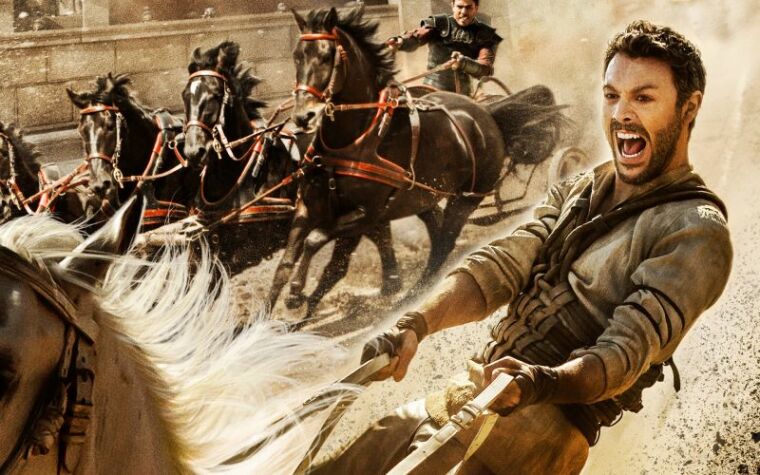New 'Ben-Hur' more about forgiveness & less about revenge, producers Mark Burnett and Roma Downey say

LOS ANGELES (Christian Examiner) -- Mark Burnett and Roma Downey have heard the criticism of their newest film, Ben-Hur. Some questions are friendly: "Why are you re-making a classic?" Others, though, are more confrontational: "How dare you!"
But Burnett and Downey – two of the executive producers of the 2016 version of the story that was a 1959 Charlton Heston classic – believe their movie will stand well on its own.
The 2016 version of Ben-Hur, which opens in theaters Friday, differs in one significant way, Burnett said: It focuses more on forgiveness and less on revenge.
"This movie more closely mirrors the novel than the '59 film," Burnett told the Christian Examiner. "The '59 movie was really a story of revenge, and we loved that [screenwriter] John Ridley had chosen a forgiveness approach."
Said Downey: "We're thrilled with the result."
The 2016 version also features more scenes with Jesus, and it includes a strong Gospel message that Christian audiences can fully embrace, Downey said.
"Woven into the fabric of it is the story of faith," Downey said. "It is because [Judah Ben-Hur] has an encounter with Jesus Christ that Judah's heart is open. There, at the foot of the cross, we see his hardness drop away."
The story is set during the time of Christ and follows Judah Ben-Hur (Jack Huston) as he is falsely accused of treason by his adoptive brother Messala (Toby Kebbell), a Roman army officer. Technically, this is the fourth live action adaptation of the 1880 Lew Wallace novel, although most moviegoers only remember the famous version that won 11 Academy Awards.
Burnett and Downey spoke with the Christian Examiner about the movie and why they got involved. Following is a transcript, edited for clarity:
Christian Examiner: Why did you want to get involved in making a 2016 version of such a classic film? Some people say this is a movie that should not have been made.
Roma Downey: Remember that we are the producers that brought The Bible. There was a boldness to that, as well, and many people said, "Oh, you should not do that. No one will watch the Bible on television." And, of course, 100 million people tuned in. Gary Barber, the CEO of MGM, asked us if we would join the [Ben-Hur] producing team, and he sent us the script, written by Oscar winner John Ridley. Mark and I read the script, and we loved the script. It focused more on the story of forgiveness and reconciliation that it did on the story of vengeance. We were excited to get on board and to work on this. It's been a great journey, and we're thrilled with the result.
CE: Did this version go back to the novel or go back to the '59 film?
Mark Burnett: This movie more closely mirrors the novel than the '59 film. You see more of Jesus. The '59 movie was really a story of revenge, and we loved that John Ridley had chosen a forgiveness approach.
CE: That leads well into the next question. What do you want people to walk away thinking and feeling?
Downey: We know that people come to the movies to be entertained. They're not really coming to the movies for a message. So it was first and foremost important that we created a movie that would do that – that would entertain. It is epic. It has scale, tension and drama, and battles and sword fighting and romance, and all of those things you would expect from a great movie. And it's so well done. And yet, the challenge was to be able to create something that had that scale and yet had an intimacy in its storytelling. Woven into the fabric of it is the story of faith. It is because [Judah Ben-Hur] has an encounter with Jesus Christ that Judah's heart is open. There, at the foot of the cross, we see his hardness drop away. We see through hearing the words of Christ, when Jesus says, "Father, forgive them, for they know not what they do" – that Judah finally understands that the revenge that he sought and the triumph that he thought he would be filled with, he felt nothing but emptiness. How often have we felt that in our lives?
It's made for entertainment purposes, but Mark and I are committed – through our company LightWorkers Media – to tell stories that illuminate the darkness. We are believers. We are interested in, whatever way we can, promoting the Gospel of Jesus.
CE: This message of forgiveness is always needed, but it seems that this message is needed now more than ever, because of our divided culture.
Downey: I think that's true. We live in at a time when there's a lot of fear and confusion and division. It is our hope that our film will be seen by millions and that that this message will resonate with audiences all around the world.